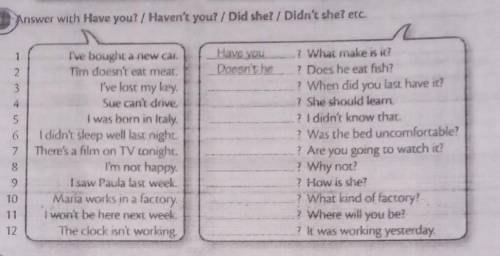Answer with Have you? / Haven't you? / Did she? / Didn't she? etc. 1.I've bought a new car
Tim doesn't eat mear.
I've lost my key.
Sue can't drive
I was born in Italy.
I didn't sleep well last night
There's a film on TV tonight.
I'm not happy.
I saw Paula last week
Maria works in a factory.
I won't be here next week,
The clock isn't working.
Have you? What make is it?
Doesn't he ? Does he eat fish?
? When did you last have it?
? She should learn
? I didn't know that.
? Was the bed uncomfortable?
? Are you going to watch it?
? Why not?
? How is she?
? What kind of factory?
? Where will you be?
? It was working yesterday.
оч надо и лучший ответ.
Очень очень надо молю васс

Другие вопросы по теме Английский язык
Популярные вопросы
- Тренувальні вправи. Перепишіть, визначте займенники, їх розряд...
3 - 5. Уявіть, що на нашій планеті раптом зникли усі гриби. До яких...
2 - Применяемая в медицине иодная настойка (спиртовой раствор иода)...
2 - В медицинской практике для промывания ран применяют раствор марганцовки....
3 - Аргументы на тему в чем заключается достоинство человека (по...
2 - Прострогать кромки доски до прямой поверхности и прямого угла...
3 - Атом металічного елемента має на три електрони більше, аніж катіон...
1 - Скільки розв язків має система рівнянь х2- y2= 0, 3x+ y =4. x2-y2...
3 - Найдите стилистически окрашенное словов предложениях 3-4 выпишите...
1 - Твір роздум головна ідея твору олександра гавроша...
1
Explanation: The statement "I've bought a new car" is in the present perfect tense, which indicates an action that started in the past and has a connection to the present. To ask a question about this, we use the auxiliary verb "have" in the present tense for the subject "you".
2. Doesn't he eat meat?
Explanation: The statement "Tim doesn't eat meat" is in the present simple tense, which indicates a general habit or fact. To ask a question about this, we use the auxiliary verb "does" in the present tense for the subject "he".
3. Have you lost your key?
Explanation: The statement "I've lost my key" is in the present perfect tense. To ask a question about this, we use the auxiliary verb "have" in the present tense for the subject "you".
4. Can't she drive?
Explanation: The statement "Sue can't drive" is in the present simple tense. To ask a question about this, we use the auxiliary verb "can" in the present tense for the subject "she".
5. Were you born in Italy?
Explanation: The statement "I was born in Italy" is in the past simple tense, which indicates a completed action in the past. To ask a question about this, we use the auxiliary verb "were" in the past tense for the subject "you".
6. Didn't you sleep well last night?
Explanation: The statement "I didn't sleep well last night" is in the past simple tense. To ask a question about this, we use the auxiliary verb "didn't" in the past tense for the subject "you".
7. Is there a film on TV tonight?
Explanation: The statement "There's a film on TV tonight" is in the present simple tense. To ask a question about this, we use the auxiliary verb "is" in the present tense for the subject "there".
8. Aren't you happy?
Explanation: The statement "I'm not happy" is in the present simple tense. To ask a question about this, we use the negative form of the auxiliary verb "are" in the present tense for the subject "you".
9. Did you see Paula last week?
Explanation: The statement "I saw Paula last week" is in the past simple tense. To ask a question about this, we use the auxiliary verb "did" in the past tense for the subject "you".
10. Does Maria work in a factory?
Explanation: The statement "Maria works in a factory" is in the present simple tense. To ask a question about this, we use the auxiliary verb "does" in the present tense for the subject "Maria".
11. Won't you be here next week?
Explanation: The statement "I won't be here next week" is in the future simple tense, which indicates a future action. To ask a question about this, we use the negative form of the auxiliary verb "will" in the future tense for the subject "you".
12. Isn't the clock working?
Explanation: The statement "The clock isn't working" is in the present simple tense. To ask a question about this, we use the negative form of the auxiliary verb "is" in the present tense for the subject "the clock".
Please note that the provided answers are based on the given prompts. The images are not accessible, so I cannot provide specific questions for them.